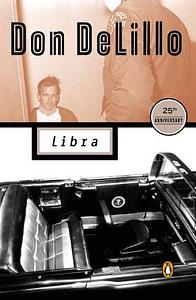Take a photo of a barcode or cover
Oswalds character arc is fascinating, it gets progressively sadder. when it contextualizes his mother’s speech about how Oswald has been picked out since birth by the government it felt just gut-wrenching.
I found the contrast of Oswalds left leaning agent of history persona to Jack Ruby’s I-am-so-mad-I-cant-stop-puking and-I-love-the-police right wing guy to be kinda funny.
I found the contrast of Oswalds left leaning agent of history persona to Jack Ruby’s I-am-so-mad-I-cant-stop-puking and-I-love-the-police right wing guy to be kinda funny.
Oddly timed reading in relation to both the election and the death of Castro, but honestly I care more that I finally delved into DeLillo and was blown away. The depth of characterization, despite how much the author intentionally leaves Oswald a cipher, is so casual, so effortless. Background figures and stray observations are so thoroughly realized but never distracting or needlessly showy. Above all I'm impressed by the balancing act that DeLillo achieves, of managing to square the all-but-certain truth of Oswald's lone gunman act and the temptation—the need, even—to tie such an unremarkable man to a larger conspiracy worthy of his crime. Oswald may indeed be a patsy here, but he does not even have the dignity of knowing it, instead manipulated by G-men and KGB alike. At least the Soviets have the decency to look him in the face while they do it.
I admire DeLillo's portrait of the Oswalds, which eschews the white-trash image favored by many in fiction and life and presents intelligent but provincial beings who never had much of a chance. I'm especially taken with the finale, which belongs not to a sobered Lee nor a panicked Jack Ruby but Lee's mom, whose testimony is at once self-apologia, willful delusion, and a bitter recrimination of every factor great and small that corrupted her son.
I admire DeLillo's portrait of the Oswalds, which eschews the white-trash image favored by many in fiction and life and presents intelligent but provincial beings who never had much of a chance. I'm especially taken with the finale, which belongs not to a sobered Lee nor a panicked Jack Ruby but Lee's mom, whose testimony is at once self-apologia, willful delusion, and a bitter recrimination of every factor great and small that corrupted her son.
dark
informative
mysterious
tense
medium-paced
Plot or Character Driven:
A mix
Strong character development:
Yes
Loveable characters:
Complicated
Diverse cast of characters:
Yes
Flaws of characters a main focus:
Yes
A book of two halves, it seems inconsistently written. It seemed to me that in the first half, DeLillo intended to write a book about a more complicated CIA plot, but by the second half he became infatuated with writing in the voice of Lee Harvey Oswald, and unceremoniously drops several of the characters, never to pick them back up.
Still a fascinating book, and a page-turner. The language and voices are excellent. If I could, I'd rate it 3.5.
Still a fascinating book, and a page-turner. The language and voices are excellent. If I could, I'd rate it 3.5.
challenging
dark
emotional
mysterious
sad
medium-paced
Plot or Character Driven:
Character
Strong character development:
Yes
Loveable characters:
Complicated
Diverse cast of characters:
Yes
Flaws of characters a main focus:
Yes
Note to self/shelf — read this Sept 9 NYT article after finishing the book. And this Sept 9 Vanity Fair article.
In Libra, Don DeLillo demonstrates his remarkable ability to create engaging dialogue and vivid settings. However, the novel reads more like a compendium of vignettes rather than a cohesive story and the momentum was difficult for me to pick up when I sat down to relax and read long sections of the book.
It's the literary equivalent of engaging in amazing sex, but needing to stop every three minutes to go wash some dishes or file paperwork. Even though I knew what the ending was going to be, it felt like labor to get there.
It's the literary equivalent of engaging in amazing sex, but needing to stop every three minutes to go wash some dishes or file paperwork. Even though I knew what the ending was going to be, it felt like labor to get there.
Rate this novel as four stars with a moral caveat. Nonfiction novels are always problematic to my taste. Yes Don DeLillo kept my attention by telling a very interesting story about Lee Harvey Oswald and the assassination of John Kennedy, however the novel’s mix of fiction and reality impacts our collective view of the event with a fictional narrative instead of the truth. Also find making money off of a national tragedy distasteful whether it’s Oliver Stone direction of JFK or Don DeLillo authoring Libra.



